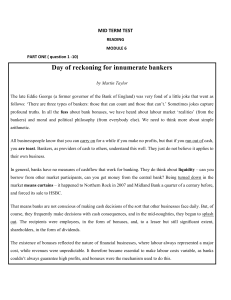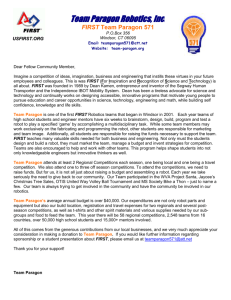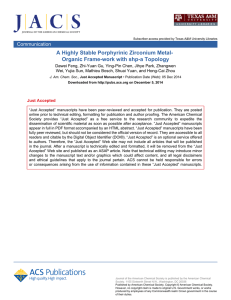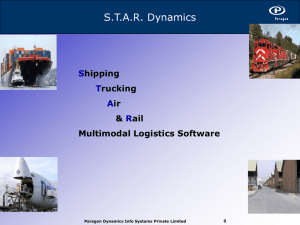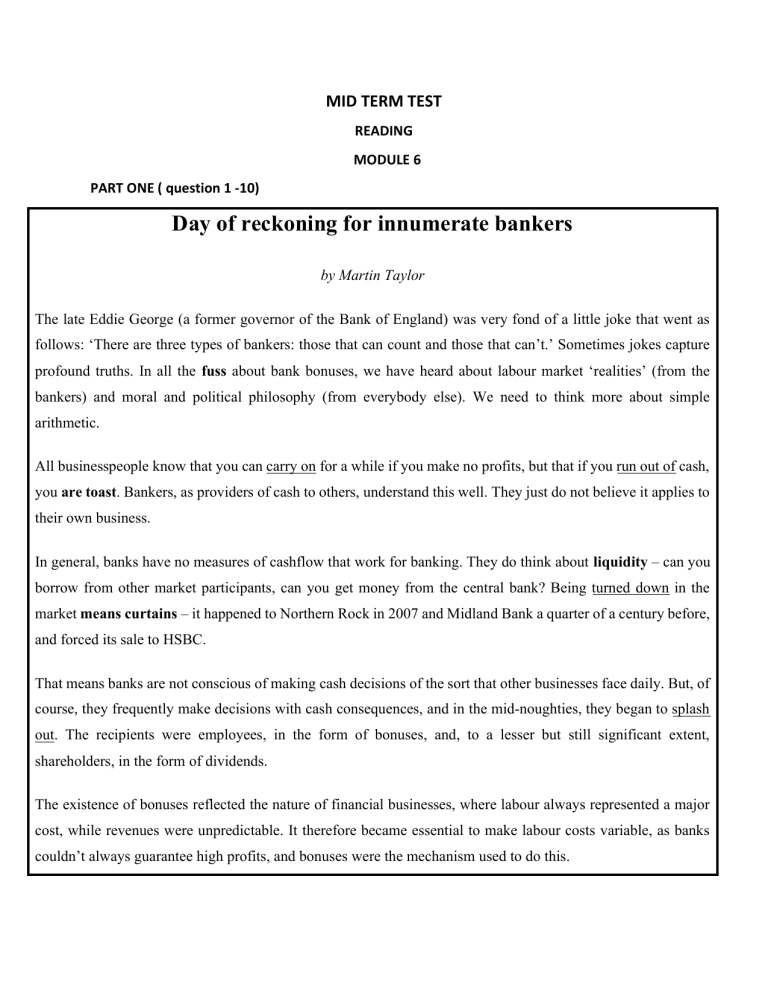
MID TERM TEST READING MODULE 6 PART ONE ( question 1 -10) Day of reckoning for innumerate bankers by Martin Taylor The late Eddie George (a former governor of the Bank of England) was very fond of a little joke that went as follows: ‘There are three types of bankers: those that can count and those that can’t.’ Sometimes jokes capture profound truths. In all the fuss about bank bonuses, we have heard about labour market ‘realities’ (from the bankers) and moral and political philosophy (from everybody else). We need to think more about simple arithmetic. All businesspeople know that you can carry on for a while if you make no profits, but that if you run out of cash, you are toast. Bankers, as providers of cash to others, understand this well. They just do not believe it applies to their own business. In general, banks have no measures of cashflow that work for banking. They do think about liquidity – can you borrow from other market participants, can you get money from the central bank? Being turned down in the market means curtains – it happened to Northern Rock in 2007 and Midland Bank a quarter of a century before, and forced its sale to HSBC. That means banks are not conscious of making cash decisions of the sort that other businesses face daily. But, of course, they frequently make decisions with cash consequences, and in the mid-noughties, they began to splash out. The recipients were employees, in the form of bonuses, and, to a lesser but still significant extent, shareholders, in the form of dividends. The existence of bonuses reflected the nature of financial businesses, where labour always represented a major cost, while revenues were unpredictable. It therefore became essential to make labour costs variable, as banks couldn’t always guarantee high profits, and bonuses were the mechanism used to do this. People in the City have always been paid well relative to others, but megabonuses are quite new. From my own experience, in the mid-nineties, no more than four or five employees of Barclays’ then investment bank were paid more than £1m, and no one got near £2m. Around the turn of the millennium, things began to take off and accelerated rapidly – after a pause in 2001-03 – so that exceptionally high remuneration was paid out between 2004 and 2007. Observers of financial services saw unbelievable prosperity and apparently immense value added. Yet two years later, the whole industry was bankrupt. A simple reason underlies this: any industry that pays out in cash colossal accounting profits that are largely imaginary will go bust quickly. Not only has the industry – and by extension societies that depend on it – been spending money that is no longer there, it has been giving away money that it only imagined it had in the first place. Worse, it seems to want to do it all again. How could they pay this imaginary wealth out in cash to their employees? Because they had no measure of cashflow to tell them they were idiots, and because everyone else was doing it. Paying out 50 per cent of revenues to staff had become the rule, even when the ‘revenues’ did not actually consist of money. How did the shareholders let them get away with this? They were sitting on the gravy train too, enjoying the views from the observation car. How did the directors let it happen? Innumeracy and inability to understand accounts. How depressing the shame and folly of it all is, when one considers that the system was brought down not because risk management was deficient (though it was), nor because greed was rampant (though it was), but because bankers could not count. Reading the article and match these definitions to the words and expressions in bold in the article. 1. when a business or person has money or goods that can be sold to pay debts 2 go bankrupt 3. when there is a lot of something bad, such as crime or disease, and it is very difficult to control 4. are in trouble because of something you have done 5. area in the center of London with many banks and financial institutions 6 feeling of being publicly embarrassed because of something wrong you did 7. attention or excitement that is usually unnecessary or unwelcome 8. used to say that something will end (informal) 9. an action that is very stupid and likely to have serious results 10. being part of an activity from which people can make money without much effort PART TWO (question 10-20) Back in 1998, Peter McGeough and Henning von Spreckelsen took then families out to dinner to tell them that they were quitting their steady jobs at carton-maker Tetra Pak because they had a brilliant solution to the leaky milk bottle top. They had a five-year plan that involved buying a factory’ in Norwich to make then sophisticated plastic caps and fully expected to sell then venture, Bapco Closures, in eight years. In fact it took them eight years to get someone to buy then idea and even then revenues were only £168,000 for the year. The plans, both for the UK factory and the target market, bit the dust much earlier, after the milk industry' pulled its support for Bapco’s p r o d u c t d e v e l o p m e n t . W h e n McGeough and his team finally found a market for then product among food producers in N o r t h America, the founders had to go back to then eight angel investors for a further £4m of cash to build a factory in the US. It was a big ask,' McGeough admits. But what he and his team did have was the entrepreneurial survivor’s instinct. ‘I could say it was stubbornness or bloody-mindedness,’ McGeough says ‘We wanted to prove to the dairy' industry’ that they were wrong but we also believed that we could come up with a solution.’ Most start-ups do not battle on for as long as Bapeo. The majority of would-be entrepreneurs fall by the wayside much sooner, exhausted by the stream of rejections or perhaps attracted back to the perceived security of a salaried post. Even a successful technology start-up can expect to be on a diet of baked beans and goodwill for three years, according to Robin Klein, founding partner of seed funding business The Accelerator Group (TAG). The length of time new entrepreneurs have to spend without salary may increase in the coming years, particularly if. as forecast, the recovery of the economy remains sluggish and the banks remain unwilling to lend. The question then becomes how best to survive, what can be cut and where else a business owner can get cash to keep trading. The temptation may be to rush mto anything that can generate revenues for the business. McGeough admits that in the lean years he and his co-founders at Bapco would do whatever consultancy work they could to keep a roof over their families' heads. Chasing revenues might not be the best strategy, according to Klein, who notes that some of the most successful start-ups, such as Internet telephony provider Skype, were far more focused on getting their product right. Skype had no revenue for years but the founders and backers were very clear that, if they could get millions of users, there was a business model lurking in there somewhereKlein says. A much better use of time is to focus on stripping out the costs of the business, according to Stefan Glaenzer, a serial entrepreneur and investor who founded Ricardo.de, Germany’s largest online auction company, before moving to London in 2000 to support other technology start-ups. Living frugally is easier for young companies run by young people, which typify many of Glaenzer's more high profile investments. For instance, in 2005 he became the first person to back Last.fm, the online music busmess based in London’s East End, which was sold just two years later to US media business CBS for $280m (£176m). Duncan Grierson, who went without a salary for three years while developing his household waste recycling business Sterecycle, not only worked from home but rented his spare bedroom and his living room floor to bring in cash. He also borrowed £25,000 from the bank under the guise of renovating his kitchen, usmg the money to pay his mortgage - a move that would certainly be more difficult in the current financial climate. The journey is not over for Sterecycle but Grierson has now built his first waste management plant in Rotherham and is processing up to 100,000 tonnes a year for three local authorities that have signed 10-year contracts. The good news for those considering taking the plunge is that :he cost of starting businesses is less with the reduction in technology costs, through innovations such as Internet telephony and freeware, software that is free to use. You can make your own luck and survive longer by choosing good packers, according to Glaenzer. ‘It all comes down to the selection of the right partners, be it mentors, advisers Dr seed investors / he says. It is helpful if your financial backers lave a passion for what you are trying :o achieve, Glaenzer notes. ‘If you have someone who is only looking at :he return on investment, they might not go the extra mile when you need :hem.’ he says Read the article and choose the best option – a, b, or c – to complete the sentences below. 11 McGeough and von Spreckelsen realised their five-year plan _____ expected. a) 12 14 15 b) later than c) earlier than Bapco Closures eventually opened their production facility _____. a) 13 as in Canada b) in the UK c) in the US Bapco _____ most start-ups. a) fought for survival longer than b) turned a profit at about the same time as c) had a better idea than Robin Klein thinks start-ups should _____. a) clearly understand their business model b) generate revenue above all else c) focus on their core business Duncan Grierson financed his start-up by _____. a) pretending to remodel part of his house b) remortgaging his house c) drawing a salary from a part-time job Match the sentence beginnings (16-20) with the best endings (a–e). 16 Peter McGeough a) worked on the core business idea and waited for the business model to become clear. 17 Robin Klein says the b) didn’t earn money from his company for three years. founders of Skype 18 Stefan Glaenzer c) paid a big return to investors in just two years. 19 Duncan Grierson d) backed a successful online music business. 20 Last.fm e) did consultancy work to generate income. PART THREE(question 21-30) Read the text below from a brochure. For each question (31-40), write one word in CAPITAL LETTERS on your Answer Sheet. There is an example at the beginning, (0). Paragon: great business space A new concept for the 21 century , paragon is (0)____ totally unique showpiece development of high-quality office and call centre buildings, hotel and leisure facilities. Many cities find ( 2 1 ) _ _ _ _ _ _ increasingly difficult to allocate office space, but the city of Wakefield Is already ahead (22) __________the game with Paragon. Paragon offers an extensive parkland setting with low-density buildings, and room to expand in the future. Yet, (23) _ _ _ _ _ _ _ _ _ the vast majority of business parks. Paragon has not been exiled to the distant edges of the city. Instead, this large site is only I km from the ccntrc of Wakefield. This offers massive advantages: employees can easily walk or cycle to work, saving stress and pollution, and significantly cutting ( 2 4 ) _ _ _ _ _ _ _ _ _ _ _ on commuting time. There is ( 2 2 ) more driving along the motorway to distant outposts of business empires for the Paragon worker. But Paragon s location sacrifices nothing ( 2 6 ) _ _ _ _ _ _ _ _ _ _ terms of communications. It is perfectly placed for road and rail networks. A further attraction of Wakefield for Paragon is the ready availability of a skilled workforce. ( 2 7 ) _ _ _ _ _ _ _ _ _ _ _ are more than 233.000 people available for work within an hours journey, and an enormous catchment population of 20 million within two hours' travel. The city has a long history ( 2 8 ) _ _ _ _ _ _ _ _ an administrative centre, and its recent success in attracting top-name companies is evidence of its solid business credentials. Figures from the developers suggest that up ( 2 9 ) _ _ _ _ _ _ _ _ 5.000 jobs could be available in the initial phase of its development, with more to follow. making it (30) of the most significant areas of employment in the region. • • PART FOUR (question 31-40) Read the text below about changes in employment patterns in the UK. In most of the lines (31-40), there is one extra word. It is either grammatically incorrect does not fit in with the meaning of the text. Some lines, however, are correct. If a line is correct, write CORRECT on your Answer Sheet. If there is an extra word in the line, write the extra word in CAPITAL LETTERS on your examples (0 and 00). 0 T H E 00 C O R I R R E C T Faculty Sent Out Into Real World 0 As companies downsize by their eliminating managers and combining many 00 functions in one, business schools have also started crossing departmental 31 lines when teaching management. One school where has recently begun 32 selecting and training some of its faculty members so that they can take over 33 some of the school's key accounts from its executive department. Selling the 34 school's executive programs was used to be the work of a separate marketing 35 division, but from now on it has been decided that the teachers themselves will 36 assume responsibility taken for portfolios from top clients.They will be prepared 37 for their new tasks in a team-teaching seminar and learn how to handle on 38 customer relations.They will also visit companies and see how they do 39 operate. Another important aspect of their training is the reading case studies 40 and learning to negotiate with and design programs.
